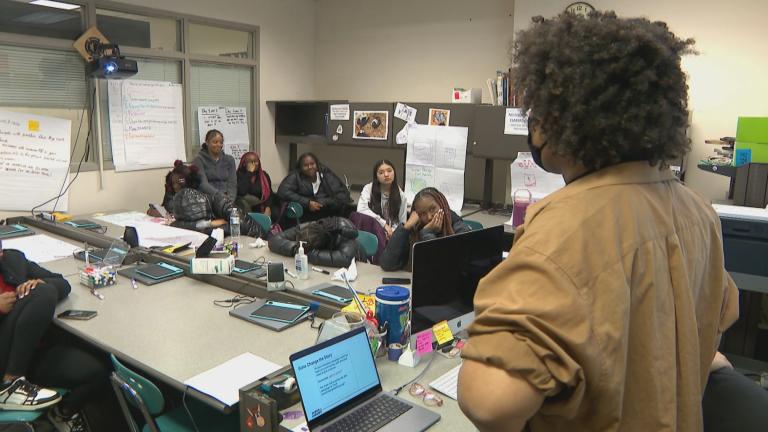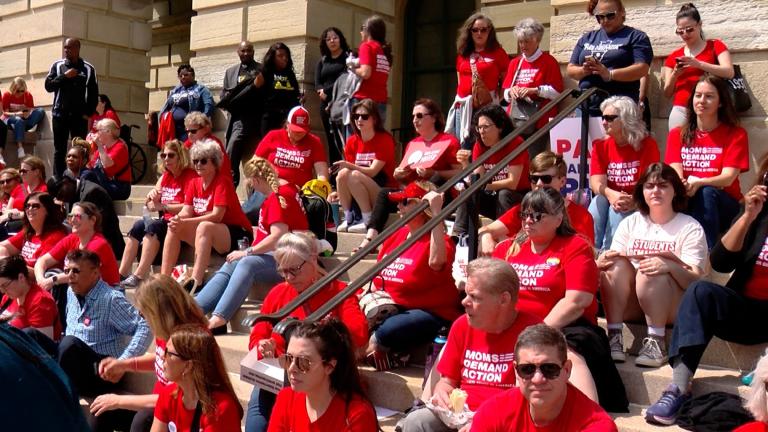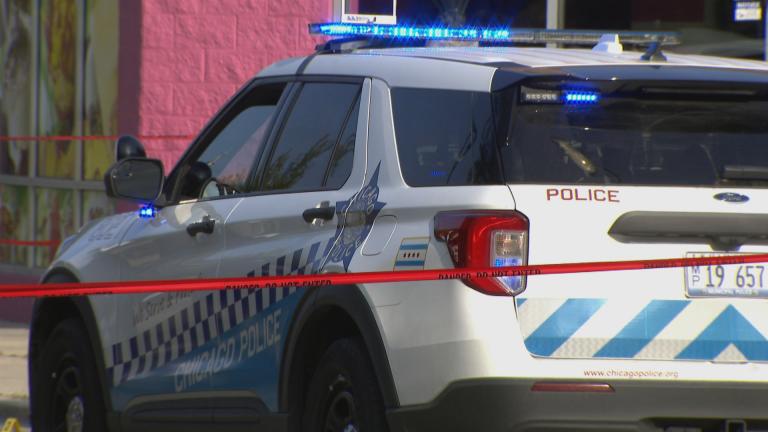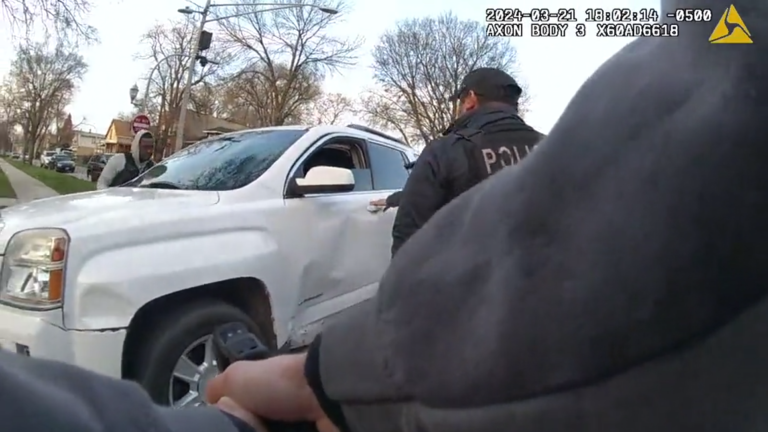A breakthrough federal bipartisan gun package got a boost Tuesday, with the tentative backing of U.S. Senate Minority Leader Mitch McConnell, a Republican from Kentucky.
As members of Congress tiptoe toward taking federal action, state legislators are likewise focused on firearms measures.
Illinois often gets mentioned in national discussions about gun laws. Following the school shooting in Uvalde, Texas Gov. Greg Abbott pointed to gun crime in Chicago as a sign that Illinois’ relatively stringent gun laws are ineffective.
Critics dispute that charge and blame neighboring states with weaker laws for neutralizing Illinois’ efforts to clamp down on gun trafficking by causing an inflow of firearms.
According to Giffords Law Center to Prevent Gun Violence, Illinois does have “strong” gun laws; the organization’s 2021 scorecard ranks the state as eighth in the nation.
• Illinois is among the states with a red flag law, which creates a path for guns to be temporarily removed from someone a court finds dangerous.
• In 2013, with its hand forced by a court order, Illinois became the final state to allow concealed carry.
• A license is required to have a gun in public. All gun-owners also must have a FOID, or Firearm Owners Identification Card.
• Last spring, Gov. J.B. Pritzker signed a law (House Bill 562 / Public Act 102-0237) to “fix” the FOID, by streamlining the process for renewing concealed carry and FOID cards, requiring sellers record private gun sales, creating a state database of stolen guns and encouraging applicants to provide their fingerprints.
But in the wake of high-profile mass shootings and surging crime, what more that can be done is getting attention.
State Rep. Denyse Wang Stoneback, a Skokie Democrat, is sponsor of a measure (House Bill 5535) that would establish a commission tasked with tackling gun trafficking, require handgun safety training for FOID applicants, and allow a search warrant to be issued so police could easier retrieve guns from someone whose FOID has been revoked.
She also said Illinois should close what she said is a loophole (House Bill 2541) that could put domestic victims in harm’s way. Per the plan, when a court grants an order of protection the alleged perpetrator (or respondent) would have to surrender to law enforcement their guns for two years.
“When someone’s FOID card is revoked because they’re a respondent of a domestic violence order of protection, they often times are allowed to transfer their firearms to an immediate family member. But sometimes they continue to have the exact same access to that weapon because they might live nearby, or they might even live in the same household. And that’s something we really need to change,” Stoneback said.
Another measure Stoneback introduced earlier this year, but which has not gotten traction, would prohibit concealed carry on “high traffic” Cook County Park District properties (HB4296), after a 2021 court ruling found that a state law banning guns on all Cook County park properties was overly broad.
Stoneback, who is facing a primary challenge for re-election, also said Illinois could assist investigations of gun crimes by requiring a ballistics technology known as microstamping.
A law signed in May (House Bill 4383 / Public Act 102-0889) bans so-called “ghost guns,” or guns without serial numbers.
But what if there’s no gun at a crime scene?
Microstamping effectively marks the bullets.
“Microstamping would make sure that there’s a code, an alphanumeric code, on the firing pin so that when a bullet is discharged, when the gun is fired, it would be imprinted on the shell casing,” Stoneback said. “And you would be able to trace that alphanumeric code imprinted on the shell casing back to the firearm without actually recovering the firearm itself. The serial, make model and the first purchaser of that gun would be data at the disposal of law enforcement.”
New York just passed a microstamping law, though doubters say it’s no magic bullet and question if the engraving could be worn off, logistics of maintaining a database and pushback from manufacturers.
So far, Stoneback’s proposal to establish a state microstamping grant program (House Bill 2769) has stalled in Springfield.
State Rep. LaShawn Ford expects his plan (House Bill 5380), also dealing with bullets, will pass once legislators re-convene.
Ford, with the backing of Cook County Sheriff Tom Dart, wants to close a loophole that lets people whose FOID cards have been revoked still buy ammunition.
“If you can’t purchase a gun, you can’t purchase ammunition. If you can’t possess a gun, you can’t possess ammunition. And if your FOID card is revoked, then you can’t go into a gun shop to purchase ammunition. Why should we allow that to continue? If people continue to buy ammunition it means that they have guns somewhere to use the ammunition for,” Ford said. “When you think about guns, the proliferation of guns, they’re going to keep on happening and I don’t know if we can stop that … so if we start targeting (bullets) … ammunition is one that we can really slow the gun violence down if we focus on that.”
Ford said Illinois should require fingerprinting as part of background checks, but recent attempts to do that failed.
Instead, Illinois, with its 2021 FOID changes, began to offer an incentive: Share fingerprints for speedier processing of gun permits.
In 2020, gun-owners filed a lawsuit against the Illinois State Police with the complaint the state was so slow dealing with FOID applications, the ISP was breaking the law.
While the state credits the 2021 law with reducing the backlog and making the process more efficient, many gun-owners, and Ford, remain unsatisfied.
“Fix the FOID is something that we really should be looking at,” Ford said. “We need to look at ways that we can get rid of it or we need to fix it, because it’s really causing a problem.”
The Republicans running for governor have likewise criticized the FOID and called for its elimination.
Gun control is not strictly partisan in Illinois.
To wit: Democrats control state government and hold supermajorities in both chambers of the state legislature, but Democrat-sponsored efforts to pass mandatory fingerprinting bills fell flat.
Given that dynamic, State Rep. Kathleen Willis, (D-Addison), says she doubts a gun registry could pass even if she believes it could help.
“We have cars registered. So why can’t we register guns? The big fear is always from the gun lobby that this is big brother stepping in too much,” Willis said. “But you know, if you are a lawful gun owner, we don’t care how many guns you own. Why are you afraid to report that?”
Willis said while she knows most guns used in crimes are illegally obtained, a registry could help given that they were initially lawfully purchased.
Willis is sponsor of a law (House Bill 4729 / Public Act 102-1067) signed just Friday that requires the state implement a public awareness campaign on safe gun storage, “trying to get gun owners to recognize the dangers of children getting a hold of guns and having tragedies happen in their households. Whether it’s little toddlers or adolescents, if those guns are safely secured – that way the gun owner will have them for what they need it for, but we can keep them out of the hands of (children) and avoid tragedies in the home.”
Bills have been introduced in the General Assembly going in the other direction, such as those lifting gun restrictions.
But those have had even more trouble advancing and that’s not likely to change soon.
Follow Amanda Vinicky on Twitter: @AmandaVinicky








